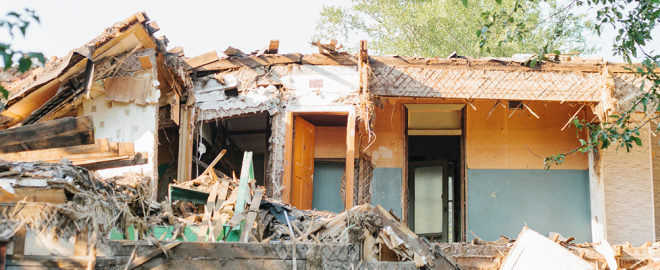
Are Your Appliances OK to Use After an Earthquake?

Has your home recently gone through an earthquake? Read these simple tips for addressing home safety concerns and how to check home appliances for gas leaks or damage following an earthquake.
Unlike some other natural disasters, earthquakes can’t be predicted — they happen without warning, when the earth slips along a fault. A strong quake may cause damage to your home and property. Here’s what you can do about your appliances if you experience an earthquake — and how to best prepare for the next one. Remember to consult your owner’s manual first for information on how to properly care for your appliances.
Need help with your appliances?
Schedule a repair todayWhat to Do After an Earthquake
Once the earthquake and any strong aftershocks have passed, assess the damage. Be sure that there are no electrical issues, such as downed or broken power lines, and that there hasn’t been any damage to your appliances or electronics before plugging them back in, says Derrick Baylor, an appliance expert at Sears. “Without verifying, you could potentially cause greater damage to the appliance — or harm to yourself. If you’re unsure, contact a professional to assess the situation.”
Look for obvious damage to gas lines, power cords and exhaust vents. Again, if there’s damage you can’t easily address, don’t use the appliance. Contact a technician instead, Baylor says.
If an appliance passes the above inspections, plug it in. Check that the indicator lights and displays are working. “If not, unplug the appliance and seek the help of a professional,” Baylor advises.
How to Check for a Gas Leak
Use your senses to check for a gas leak. A hissing sound might indicate a leak, as would a rotten egg odor. If you detect either of these, immediately open the windows and head outside and far from the home. Never walk around with a lit match searching for a leak, flip on electrical switches, use your appliances or even use your cell phone — sparks can ignite gas from broken lines.
Shut off the main gas valve. You’ll need a professional to restore your service. Never try to restore service yourself.
What to Do Before an Earthquake
First, know where your gas shutoff valve is located (it’s often in the basement) and how to switch it off. The main — or street-side valve — needs to be turned off with a wrench, so keep the appropriate tool nearby. However, gas companies prefer homeowners to turn off the gas supply using the house-side valve. It may be up near the ceiling and have a large yellow handle. If you live in an earthquake-prone area like California, consider purchasing earthquake-actuated shut-off valves for individual appliances.
You can also help save appliances — and possibly yourself — from harm by anchoring large appliances to the walls. There are even devices called earthquake straps for this purpose. To keep things from falling out of your refrigerator, attach child locks to the doors.
No one knows when an earthquake will strike, but following these tips can help you prepare and deal with the aftermath safely.
https://www.searshomeservices.com/blog/are-your-appliances-ok-to-use-after-an-earthquake
